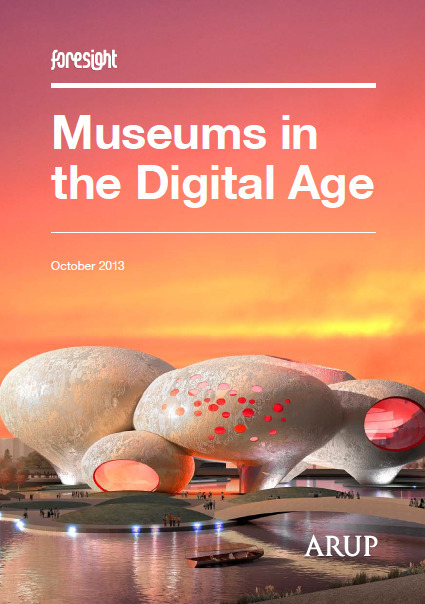
|
Scooped by
Robin Good
July 17, 2014 4:16 AM
|
Justin Fowler, co-founder of AudioPress, offers valuable insight into what the future of search and curation may be, by providing a relevant and sound pattern to look at: music.
He writes on TheNextWeb:
"Context is key for music, and that is where services like Songza and Beats Music are picking up tips from FM radio. These services are essentially using algorithms to help people discover new playlists, instead of discovering new songs. This allows for a marriage of both technology and human curation."
Accordingly, as time goes by, I expect to see search engines increasingly highlight and direct searchers to quality curators, hubs and on-topic collections and specialized resources, rather than to individual, one-topic-only pages.
Search engines will increasingly be gateways to curators and content collections rather than to individual tracks and pages.
This will be particularly true especially when you will query a topic, a theme or interest, or better yet, a musical genre.
In all of these situations, where you want to dive, discover and learn more about a topic, it is much better to be offered a selection of playlists, compilations, collections or hubs covering that theme rather than a specific song, product or artist.
That is, search and discoverability of content will rely more and more on intermediaries that will take on the load to make sense and organize in the best possible way, a specific realm of information (it can be a music genre, or the analysis of a biological topic) rather than - as it happens today - provide a linear list of individual web pages that is supposed to cover that topic.
If the music industry, is, like other times before, an early indicator of how things will work out in the future, it makes a lot of sense to expect that the future of content discovery and search will be increasingly in the hands of curators, greatly helped and supported by sophisticated, but hackable and adjustable algorithms.
What do you think?
Rightful. Indicative of things to come. 8/10
Full article: http://trove.com/me/content/Cc1qT
Reading time: 4':20"



 Your new post is loading...
Your new post is loading...





















https://acheterozempic5mg.com/
https://acheterozempic5mg.com/shop/
https://acheterozempic5mg.com/product/acheter-adipex-37-5-mg/
https://acheterozempic5mg.com/product/acheter-mounjaro-en-ligne/
https://acheterozempic5mg.com/product/acheter-ozempic-0-25/
https://acheterozempic5mg.com/product/acheter-ozempic-1mg/
https://acheterozempic5mg.com/product/acheter-ozempic-0-5-mg/
https://acheterozempic5mg.com/product/acheter-ozempic-2mg/
https://acheterozempic5mg.com/product/acheter-saxenda-en-ligne/
https://acheterozempic5mg.com/product/acheter-wegovy-en-ligne/
https://acheterozempic5mg.com/product-category/medicaments-contre-l...
https://acheterozempic5mg.com/product/acheter-de-loxycodone/
https://acheterozempic5mg.com/product/acheter-percocet-en-ligne/
https://acheterozempic5mg.com/product/acheter-morphine-en-ligne/
https://acheterozempic5mg.com/product/acheter-depo-testosterone/
https://acheterozempic5mg.com/product/acheter-vyvanse-en-ligne/
https://acheterozempic5mg.com/product/acheter-zepbound-en-ligne/
https://ozempickopen.com/
https://ozempickopen.com/shop/
https://ozempickopen.com/product-categorie/weight-loss-medications/
https://ozempickopen.com/product/koop-ozempic-0-25mg/
https://ozempickopen.com/product/koop-ozempic-0-5mg/
https://ozempickopen.com/product/koop-ozempic-1mg-online/
https://ozempickopen.com/product/koop-ozempic-2mg-online/
https://ozempickopen.com/product/koop-adipex-online/
https://ozempickopen.com/product/mounjaro-kopen/
https://ozempickopen.com/product/koop-mounjaro-online/
https://ozempickopen.com/product/saxenda-kopen/
https://ozempickopen.com/product/koop-wegovy-online/
https://ozempickopen.com/product/koop-zepbound-online/
https://ozempickopen.com/product/koop-rybelsus-online/
https://ozempickopen.com/product/koop-oxycodon-5mg/
https://ozempickopen.com/product/koop-oxycodon-10-mg/
https://ozempickopen.com/product/oxycodon-kopen-online/
https://ozempickopen.com/product/oxycodon-kopen/
https://ozempickopen.com/product/koop-morfine-online/
https://ozempickopen.com/product/koop-depo-testosterone/
https://ozempickopen.com/product/koop-anadrol-oxymetholone/
https://ozempickopen.com/product/koop-oxymetholone-50-mg/
https://ozempiccomprar1mg.com/
https://ozempiccomprar1mg.com/compra-ahora/
https://ozempiccomprar1mg.com/product/ozempic-comprar-sin-receta/
https://ozempiccomprar1mg.com/product/comprar-ozempic-online/
https://ozempiccomprar1mg.com/product/comprar-ozempic/
https://ozempiccomprar1mg.com/product/comprar-ozempic-2mg/
https://ozempiccomprar1mg.com/product/comprar-mounjaro-sin-receta/
https://ozempiccomprar1mg.com/product/comprar-saxenda-espana/
https://ozempiccomprar1mg.com/product/comprar-wegovy-en-linea/
https://ozempiccomprar1mg.com/product/comprar-actiskenan/
https://ozempiccomprar1mg.com/product/comprar-metadona-en-linea/
https://ozempiccomprar1mg.com/product/comprar-oxicodona-5mg/
https://ozempiccomprar1mg.com/product/comprar-oxycontin-10mg-en-linea/
https://ozempiccomprar1mg.com/product/comprar-depo-testosterone/
https://ozempickopen.com/product/koop-oxycodon-10-mg/
https://ozempickopen.com/product/oxycodon-kopen-online/
https://ozempickopen.com/product/oxycodon-kopen/
https://ozempickopen.com/product/koop-oxycontin-online/
https://ozempickopen.com/product/koop-morfine-online/
https://ozempickopen.com/product/koop-adipex-online/
https://ozempickopen.com/product/koop-depo-testosterone/
https://acquistoozempic.com/
https://acquistoozempic.com/acquista-il-tuo-iniettabile-ozempic/
https://acquistoozempic.com/Prodotto/acquista-ozempic-0-25-mg/
https://acquistoozempic.com/Prodotto/acquisto-ozempic-senza-ricetta/
https://acquistoozempic.com/Prodotto/acquista-ozempic-1mg/
https://acquistoozempic.com/Prodotto/acquisto-ephedrine/
https://acquistoozempic.com/Prodotto/acquista-phentermine-online/
https://acquistoozempic.com/Prodotto/acquista-saxenda-online/
https://acquistoozempic.com/Prodotto/acquisto-wegovy-online/
https://acquistoozempic.com/Prodotto/acquista-mounjaro-5-mg/
https://acquistoozempic.com/Prodotto/acquista-zepbound-2-5-mg/
https://acquistoozempic.com/Prodotto/acquista-zepbound-10-mg/
https://acquistasubutexonline.com/
https://acquistasubutexonline.com/prodotto/
https://acquistasubutexonline.com/prodotto/acquista-ozempic/
https://acquistasubutexonline.com/prodotto/acquista-saxenda-online/
https://acquistasubutexonline.com/prodotto/acquista-wegovy-in-italia/
https://acquistasubutexonline.com/prodotto/acquista-zepbound/
https://acquistasubutexonline.com/prodotto/acquista-subutex-online/
https://acquistasubutexonline.com/prodotto/acquista-methadone-in-it...
https://acquistasubutexonline.com/prodotto/acquista-actiskenan-online/
https://acquistasubutexonline.com/prodotto/acquista-morphine-online/
https://acquistasubutexonline.com/prodotto/acquista-ossicodone-online/
https://acquistasubutexonline.com/prodotto/efedrina-acquisto-online/
https://acquistasubutexonline.com/prodotto/acquista-vyvanse-online/
https://acquistasubutexonline.com/prodotto/acquista-methadone-in-it...
https://acquistasubutexonline.com/prodotto/acquista-adipex-online/
https://acquistasubutexonline.com/prodotto/acquista-victoza-online/
https://acquistasubutexonline.com/prodotto/acquista-qsymia-online/
https://acquistasubutexonline.com/
https://acquistasubutexonline.com/prodotto/
https://acquistasubutexonline.com/prodotto/acquista-saxenda-online/
https://acquistasubutexonline.com/prodotto/acquista-subutex-online/
https://acquistasubutexonline.com/prodotto/acquista-victoza-online/
https://acquistasubutexonline.com/prodotto/acquista-qsymia-online/
https://acquistasubutexonline.com/prodotto/acquista-qsymia-online/
https://acquistasubutexonline.com/prodotto/acquista-duromine-online/
https://acquistasubutexonline.com/prodotto/acquista-methadone-in-it...
https://acquistasubutexonline.com/prodotto/acquista-actiskenan-online/
https://acquistasubutexonline.com/prodotto/acquista-morphine-online/
https://acquistasubutexonline.com/prodotto/acquista-ossicodone-online/
https://acquistasubutexonline.com/prodotto/acquista-dexedrine-online/
https://acquistasubutexonline.com/prodotto/acquista-pillole-analog-...
https://acquistasubutexonline.com/prodotto/acquista-ritalin/
https://acquistasubutexonline.com/prodotto/acquista-vyvanse-online/
https://acquistasubutexonline.com/prodotto/efedrina-acquisto-online/
https://acquistasubutexonline.com/prodotto/acquista-toseina-codeine/
https://acquistasubutexonline.com/prodotto/acquista-adipex-online/
https://acquistasubutexonline.com/prodotto/acquista-belviq-online/
https://acquistasubutexonline.com/prodotto/acquista-duromine-online/
https://acquistasubutexonline.com/prodotto/acquista-ozempic/
https://acquistasubutexonline.com/prodotto/acquista-ossicodone-online/
https://acquistasubutexonline.com/prodotto/acquista-qsymia-online/
https://acquistasubutexonline.com/prodotto/acquista-wegovy-in-italia/
https://acquistasubutexonline.com/prodotto/8311acquista-xenical-onl...
Aeropuerto Adolfo Suárez Madrid-Barajas
@gmail.com
koop ozempic Nederland
koop ozempic voor gewichtsverlies
Koop pillen om af te vallen
koop ozempic 0.25 mg
koop depo testosterone 200mg
koop wegovy
acquista saxenda
acquista subutex online
acquista ozempic
acquista qsymia
koop ozempic Amsterdam
koop ozempic Rotterdam
koop ozempic Eindhoven
mounjaro koop
zepbound koop
rybelsus koop
saxenda koop
wegovy koop
koop oxycodon-10
oxycodon 40mg koop
koop oxycodon
oxycontin koop
morfine koop
adipex koop
koop Depo Testosterone
koop oxymetholone 25 mg
koop oxymetholone 50 mg
acquisto ozempic
ozempic prezzo
acquistare ozempic 0.5mg
acquistare ozempic senza ricetta
acquistare ozempic 1mg
acquistare ephedrine
acquistare phentermine
acquistare saxenda
acquistare wegovy
ozempic comprar 1mg "> acquistare ozempic 1mg
comprar ozempic 1mg
ozempic comprar sin receta
ozempic comprar online
ozempic comprar
comprar ozempic 2mg
comprar mounjaro
comprar wegovy
comprar saxenda
comprar oxycontin-10mg
comprar depo testosterone
acheter ozempic
Acheter Ozempic 0.25 mg
Acheter Ozempic 0.25 mg
Acheter Ozempic 0.5 mg
ozempic perte de poid
ozempic saxenda
ozempic wegovy en ligne
ozempic perte de poid
ozempic oxycodone en ligne
ozempic percocet en ligne
ozempic morphine en ligne
ozempic testosterone en ligne
ozempic vyvanse en ligne
ozempic zepbound en ligne
acquista subutex online
acquista saxenda
acquista subutex
acquista victoza
acquista qsymia
acquista duromine
acquista methadone
acquista actiskenan
acquista morphine
acquista oxicodona
acquista sevredol
acquista dexedrine online
acquista pillole
acquista ritalin
acquista vyvanse
efedrina acquisto
acquista adipex
acquista belviq
acquista duromine
acquista ozempic
acquista qsymia